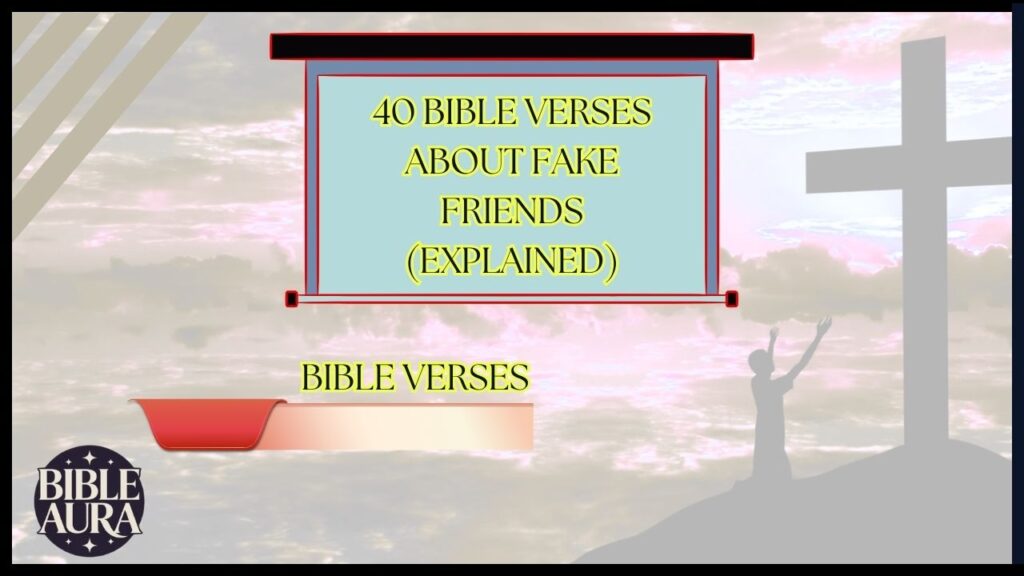Bible Verses About Fake Friends: Scripture offers profound wisdom about human relationships, especially when it comes to distinguishing true friendship from its counterfeit. We all encounter people who present themselves as friends but whose actions reveal different intentions.
The Bible, with its timeless insights into human nature, provides guidance on recognizing insincerity, protecting our hearts, and understanding the value of authentic friendship.
In a world where social connections can sometimes feel superficial, God’s Word offers clarity about what real friendship entails and how to navigate relationships with wisdom and discernment.
Signs of False Friendship in Scripture
1. Proverbs 26:24-25
“Enemies disguise themselves with their lips, but in their hearts they harbor deceit. Though their speech is charming, do not believe them, for seven abominations fill their hearts.”
This verse warns about people who speak pleasantly while concealing harmful intentions. It reminds us to pay attention to inconsistencies between someone’s words and actions, as charming speech can mask a deceitful heart.
2. Psalm 55:21
“His talk is smooth as butter, yet war is in his heart; his words are more soothing than oil, yet they are drawn swords.”

David describes someone whose speech feels comforting and kind, but whose true intentions are harmful. This verse teaches us to be discerning about flattery and overly smooth words that might conceal hostility.
3. Proverbs 27:6
“Wounds from a friend can be trusted, but an enemy multiplies kisses.”
True friends sometimes tell us difficult truths for our benefit, while fake friends might offer excessive flattery. Consider whether those in your life are willing to speak honest words, even when uncomfortable.
4. Jeremiah 9:8
“Their tongue is a deadly arrow; it speaks deceitfully. With their mouths they all speak cordially to their neighbors, but in their hearts they set traps for them.”
Jeremiah highlights the disconnect between friendly outward behavior and harmful intentions. This verse encourages us to pray for discernment regarding those who appear friendly but secretly plan to harm us.
5. Proverbs 29:5
“Those who flatter their neighbors are spreading nets for their feet.”
Excessive flattery is often a warning sign of false friendship. When someone consistently flatters without substance, they may be attempting to manipulate rather than build an authentic relationship.
The Behavior of Unreliable Friends
6. Proverbs 19:4
“Wealth attracts many friends, but even the closest friend of the poor person deserts them.”
This verse reveals how some friendships are conditional upon circumstances. Fake friends may appear when things are going well but disappear during hardship. Reflect on which relationships have endured through both good and difficult times.
7. Proverbs 19:6-7
“Many curry favor with a ruler, and everyone is the friend of one who gives gifts. The poor are shunned by all their relatives how much more do their friends avoid them! Though the poor pursue them with pleading, they are nowhere to be found.”
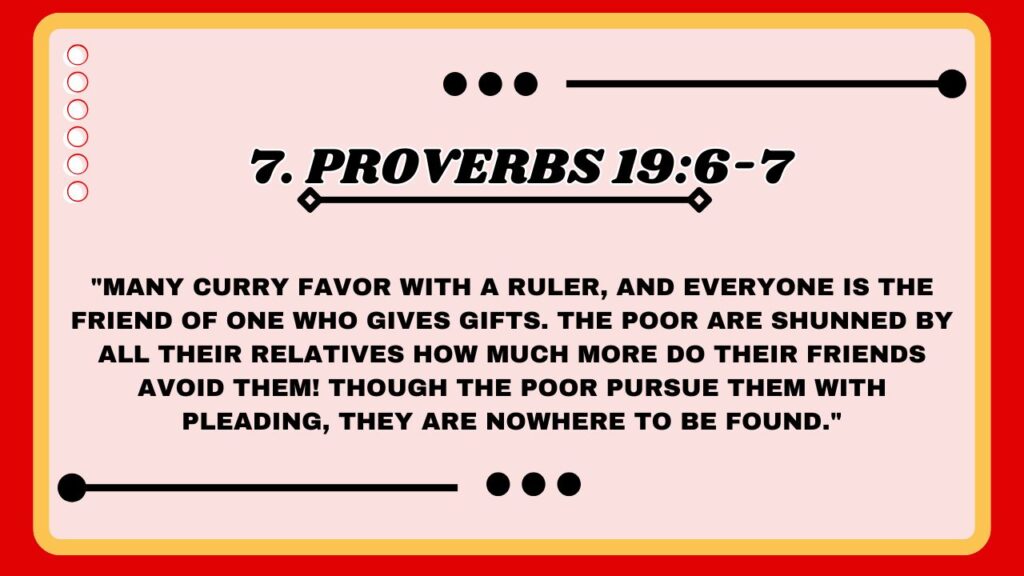
These verses show how some people form relationships based on what they can gain. Consider whether certain friendships in your life are primarily transactional or based on genuine care.
8. Job 19:19
“All my intimate friends detest me; those I love have turned against me.”
Job experienced the pain of friends who abandoned him during his suffering. This verse reminds us that difficult circumstances often reveal the true nature of our friendships.
9. Psalm 41:9
“Even my close friend, someone I trusted, one who shared my bread, has turned against me.”
David laments betrayal by someone he considered a trusted friend. This verse acknowledges the particular pain of betrayal from those closest to us and reminds us that even biblical figures experienced false friendship.
10. Matthew 26:49-50
“Going at once to Jesus, Judas said, ‘Greetings, Rabbi!’ and kissed him. Jesus replied, ‘Do what you came for, friend.’ Then the men stepped forward, seized Jesus and arrested him.”
Perhaps the most famous example of betrayal in scripture, Judas’s actions teach us that sometimes those closest to us can harbor the deepest deception. Jesus’s response demonstrates gracious strength even in the face of betrayal.
Wisdom for Protecting Your Heart
11. Proverbs 12:26
“The righteous choose their friends carefully, but the way of the wicked leads them astray.”
This proverb emphasizes the importance of being selective about close relationships. Exercise prayerful discernment when developing friendships, recognizing their significant influence on your spiritual journey.
12. 1 Corinthians 15:33
“Do not be misled: ‘Bad company corrupts good character.'”
Paul warns about the negative influence of harmful relationships. This verse encourages us to evaluate whether our friendships are building us up in faith or leading us away from godly values.
13. Proverbs 13:20
“Walk with the wise and become wise, for a companion of fools suffers harm.”
Our close associations shape us profoundly. This verse encourages building relationships with those who demonstrate wisdom and avoiding those whose foolish behavior could lead to our harm.
14. Proverbs 22:24-25
“Do not make friends with a hot-tempered person, do not associate with one easily angered, or you may learn their ways and get yourself ensnared.”
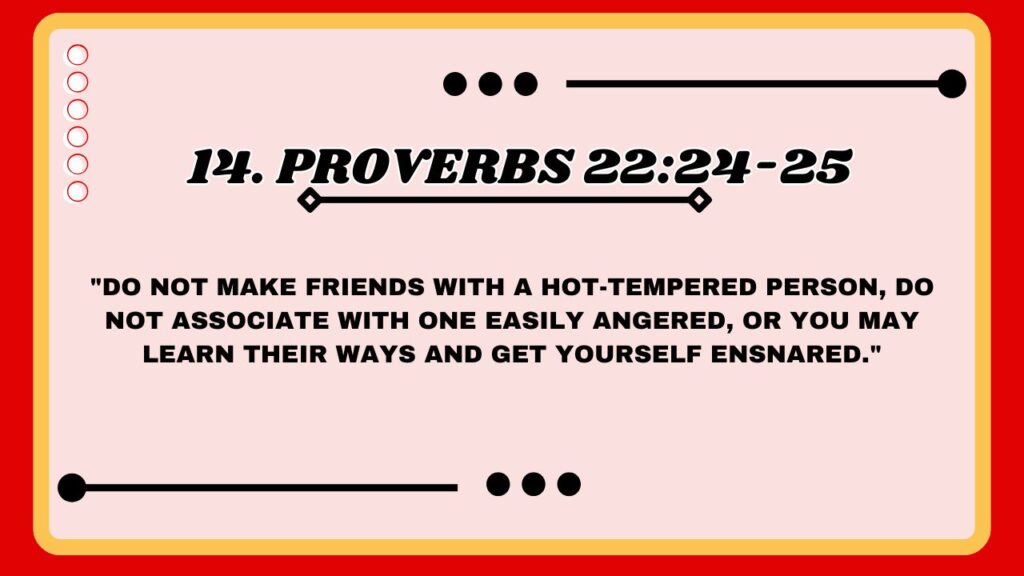
This practical advice warns against close relationships with those who lack self-control. Consider whether certain friendships are exposing you to negative patterns that might become your own.
15. 2 Timothy 3:5
“…having a form of godliness but denying its power. Have nothing to do with such people.”
Paul cautions against those who present a religious appearance without authentic faith. This verse reminds us to seek friends whose faith is demonstrated through their actions, not just their words.
16. Psalm 1:1
“Blessed is the one who does not walk in step with the wicked or stand in the way that sinners take or sit in the company of mockers.”
This psalm describes progressive levels of harmful association. Evaluate whether any relationships are gradually drawing you toward values or behaviors that contradict your faith.
17. Proverbs 14:7
“Stay away from a fool, for you will not find knowledge on their lips.”
Scripture advises distance from those who consistently demonstrate foolishness. Consider whether certain relationships are hindering your growth in wisdom and discernment.
18. 2 Corinthians 6:14
“Do not be yoked together with unbelievers. For what do righteousness and wickedness have in common? Or what fellowship can light have with darkness?”
While this applies primarily to marriage, the principle extends to close friendships. Consider whether your closest relationships support or undermine your faith journey.
19. Ephesians 5:6-7
“Let no one deceive you with empty words, for because of such things God’s wrath comes on those who are disobedient. Therefore do not be partners with them.”
Paul warns against associating closely with those who might lead believers astray. This verse encourages examining whether certain friendships involve pressure to compromise biblical values.
20. Proverbs 20:19
“A gossip betrays a confidence; so avoid anyone who talks too much.”
This practical advice identifies loose speech as a warning sign. Someone who freely shares others’ secrets will likely share yours as well, suggesting they cannot be trusted with close friendship.
Also Read: 41 Important Bible Verses About Letting Go
Characteristics of True Friendship
21. Proverbs 17:17
“A friend loves at all times, and a brother is born for a time of adversity.”
In contrast to fake friends, genuine friends demonstrate consistent love regardless of circumstances. Reflect on which relationships in your life have shown this kind of steadfast commitment.
22. John 15:13
“Greater love has no one than this: to lay down one’s life for one’s friends.”
Jesus defines the ultimate friendship as sacrificial love. While few friendships require literal life sacrifice, true friends consistently put others’ needs before their own interests.
23. Proverbs 18:24
“One who has unreliable friends soon comes to ruin, but there is a friend who sticks closer than a brother.”
This verse contrasts harmful, undependable friendships with the rare, profound bond that exceeds even family ties. Consider which relationships in your life demonstrate this exceptional loyalty.
24. Ecclesiastes 4:9-10
“Two are better than one, because they have a good return for their labor: If either of them falls down, one can help the other up. But pity anyone who falls and has no one to help them up.”
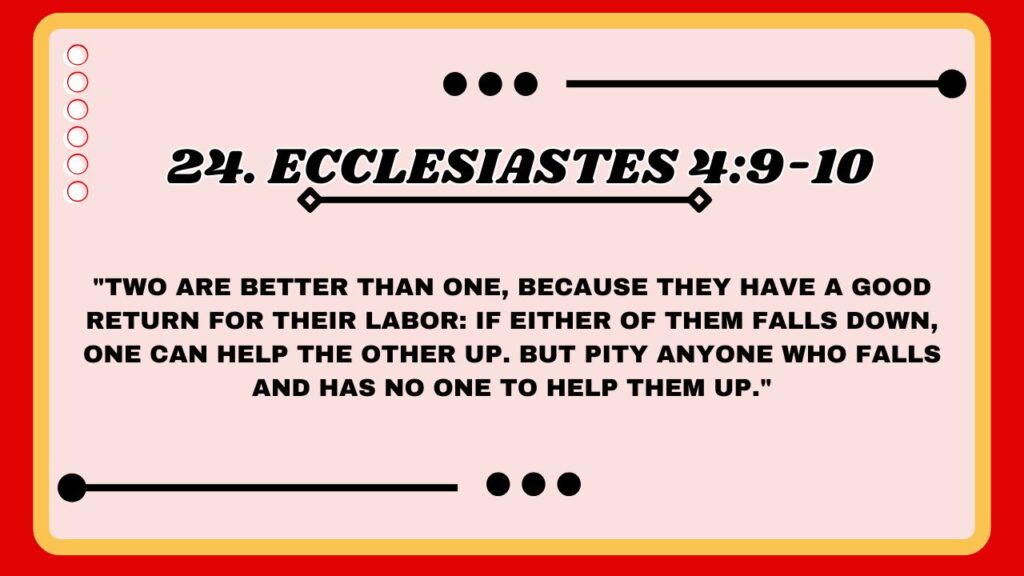
True friendship offers mutual support during difficulties. Evaluate whether your friendships involve reciprocal care or if they’re primarily one-sided.
25. Proverbs 27:9
“Perfume and incense bring joy to the heart, and the pleasantness of a friend springs from their heartfelt advice.”
Genuine friendship includes honest counsel given from sincere concern. Authentic friends offer guidance aimed at your wellbeing, not manipulation for their benefit.
26. Proverbs 27:17
“As iron sharpens iron, so one person sharpens another.”
True friendship involves mutual growth and improvement. Consider whether your close relationships challenge you to become better or merely reinforce existing patterns.
27. Colossians 3:13
“Bear with each other and forgive one another if any of you has a grievance against someone. Forgive as the Lord forgave you.”
Authentic friendship includes grace for imperfections. Real friends practice forgiveness rather than keeping score of wrongs or abandoning the relationship at the first conflict.
28. Galatians 6:2
“Carry each other’s burdens, and in this way you will fulfill the law of Christ.”
True friendship involves practical support during difficulties. Evaluate whether your friendships include willingness to help during challenging seasons.
29. 1 Thessalonians 5:11
“Therefore encourage one another and build each other up, just as in fact you are doing.”
Authentic friendship includes consistent encouragement. Consider whether your close relationships regularly include words and actions that strengthen rather than diminish.
30. Romans 12:15
“Rejoice with those who rejoice; mourn with those who mourn.”
Genuine friendship involves sharing in both joys and sorrows. Reflect on whether certain relationships include authentic emotional connection in all circumstances.
Responding to Fake Friends with Grace
31. Matthew 5:44
“But I tell you, love your enemies and pray for those who persecute you.”
Jesus calls us to respond to mistreatment with love. When facing betrayal or false friendship, prayer for those who have hurt us transforms our hearts and honors God.
32. Romans 12:17-18
“Do not repay anyone evil for evil. Be careful to do what is right in the eyes of everyone. If it is possible, as far as it depends on you, live at peace with everyone.”

This passage guides our response to betrayal. Rather than seeking revenge, we’re called to maintain our integrity and pursue peace where possible.
33. Luke 6:28
“Bless those who curse you, pray for those who mistreat you.”
Jesus teaches a counterintuitive response to mistreatment. When fake friends harm us, blessing them rather than cursing them reflects Christ’s character in our lives.
34. Romans 12:19-21
“Do not take revenge, my dear friends, but leave room for God’s wrath, for it is written: ‘It is mine to avenge; I will repay,’ says the Lord. On the contrary: ‘If your enemy is hungry, feed him; if he is thirsty, give him something to drink. In doing this, you will heap burning coals on his head.’ Do not be overcome by evil, but overcome evil with good.”
This passage reminds us that responding to betrayal with kindness rather than vengeance demonstrates spiritual maturity and leaves justice in God’s hands.
35. Ephesians 4:31-32
“Get rid of all bitterness, rage and anger, brawling and slander, along with every form of malice. Be kind and compassionate to one another, forgiving each other, just as in Christ God forgave you.”
Paul encourages releasing negative emotions toward those who’ve hurt us. Choosing forgiveness frees us from the burden of resentment, even when reconciliation isn’t possible.
36. Proverbs 24:17-18
“Do not gloat when your enemy falls; when they stumble, do not let your heart rejoice, or the LORD will see and disapprove and turn his wrath away from them.”
This wisdom warns against finding satisfaction in the downfall of those who’ve betrayed us. Maintaining compassion even toward those who’ve been false friends honors God’s character.
37. Matthew 6:14-15
“For if you forgive other people when they sin against you, your heavenly Father will also forgive you. But if you do not forgive others their sins, your Father will not forgive your sins.”
Jesus connects our willingness to forgive others with receiving God’s forgiveness. This reminds us that releasing those who’ve betrayed us is essential for our spiritual health.
38. Hebrews 12:14-15
“Make every effort to live in peace with everyone and to be holy; without holiness no one will see the Lord. See to it that no one falls short of the grace of God and that no bitter root grows up to cause trouble and defile many.”
This passage warns about the spiritual danger of harboring bitterness. Choosing to release offenses protects our hearts from the poison of resentment.
39. Colossians 3:12-14
“Therefore, as God’s chosen people, holy and dearly loved, clothe yourselves with compassion, kindness, humility, gentleness and patience. Bear with each other and forgive one another if any of you has a grievance against someone. Forgive as the Lord forgave you. And over all these virtues put on love, which binds them all together in perfect unity.”
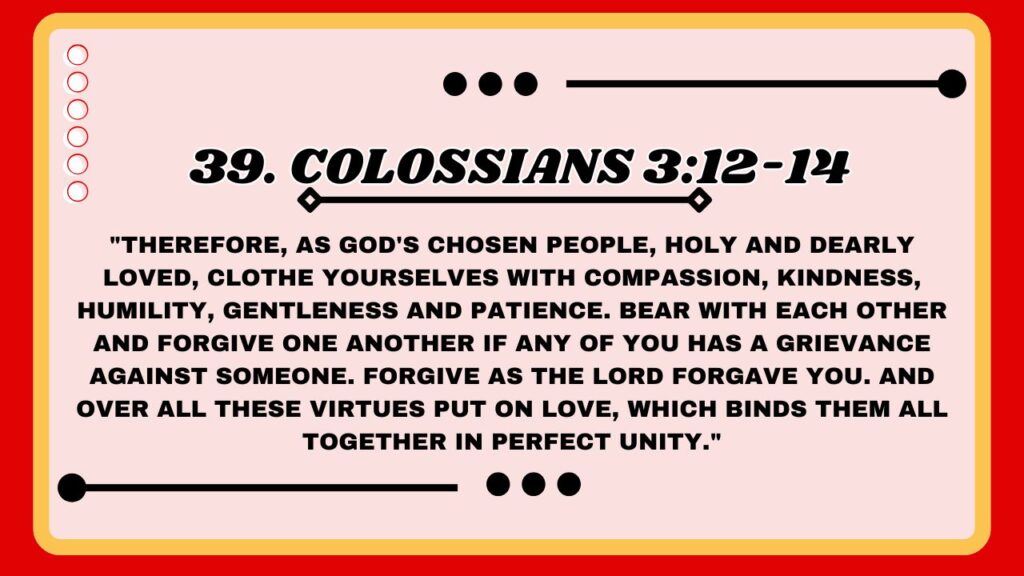
Paul describes the character we’re called to demonstrate even when mistreated. These qualities enable us to respond to false friends with integrity rather than in kind.
40. 1 Peter 3:9
“Do not repay evil with evil or insult with insult. On the contrary, repay evil with blessing, because to this you were called so that you may inherit a blessing.”
Peter emphasizes responding to mistreatment with blessing. This radical approach follows Christ’s example and opens the door to God’s blessing in our lives.
Also Read: 47 Bible Verses About Being Set Apart (Explained)
Conclusion: Bible Verses About Fake Friends
Scripture provides profound wisdom for navigating the painful reality of fake friendships. While betrayal and false relationships are part of human experience, God’s Word offers both practical guidance for discernment and spiritual direction for responding with grace.
These verses remind us that while we cannot control others’ sincerity, we can choose wisdom in forming relationships and Christ-like responses when betrayed. True friendship reflects God’s design for human connection consistent, sacrificial, honest, and uplifting.
As you apply these biblical principles, may you develop increasing discernment about the relationships in your life while maintaining a heart of compassion even toward those who prove untrustworthy. Remember that ultimately, Jesus offers the perfect friendship one that will never disappoint or betray.
Bonus: Practical Applications
- Create a friendship evaluation journal: Review these verses and create reflection questions to prayerfully consider your current relationships.
- Form a Bible study group: Invite trusted friends to study these verses together, sharing experiences and wisdom about healthy relationships.
- Memorize key verses: Select 3-5 verses that particularly speak to your situation and commit them to memory for times when you need guidance.
- Practice forgiveness prayer: When struggling with feelings of betrayal, use Scripture as a guide for prayers of release and forgiveness.
- Seek godly counsel: If navigating a particularly difficult friendship situation, share these verses with a pastor or Christian counselor for guidance.
Frequently Asked Questions
How can I tell if someone is a fake friend according to the Bible?
Scripture suggests several warning signs: inconsistency between words and actions (Proverbs 26:24-25), excessive flattery (Proverbs 29:5), disappearance during difficult times (Proverbs 19:4), pursuing friendship for personal gain (Proverbs 19:6-7), and betraying confidences (Proverbs 20:19). The Bible encourages evaluating the fruit of someone’s actions rather than just their words.
Does the Bible say I should end friendships with people who betray me?
Scripture doesn’t provide a one-size-fits-all answer. While verses like Proverbs 14:7 suggest distance from those who consistently demonstrate harmful behavior, passages like Matthew 5:44 call us to love even those who mistreat us. Wisdom, prayer, and sometimes counsel from mature believers can help determine whether a relationship should be ended, maintained with boundaries, or fully restored through reconciliation.
How can I be a true friend according to biblical principles?
Authentic friendship involves consistent love regardless of circumstances (Proverbs 17:17), sacrificial care (John 15:13), honest communication (Proverbs 27:6), mutual support (Ecclesiastes 4:9-10), and encouraging spiritual growth (Proverbs 27:17). By embodying these qualities, you demonstrate Christ-like friendship to others.
What does the Bible say about forgiving friends who have hurt me?
Scripture consistently emphasizes forgiveness as essential for believers. Passages like Colossians 3:13 and Matthew 6:14-15 connect our willingness to forgive others with our own experience of God’s forgiveness. While forgiveness doesn’t always mean restoration of the relationship to its former state, it releases us from bitterness and honors God’s command.
Can I protect myself from fake friends while still being loving and Christ-like?
Yes. Jesus himself demonstrated this balance by being “shrewd as snakes and as innocent as doves” (Matthew 10:16). Wisdom in forming relationships (Proverbs 12:26) can coexist with genuine love toward all people. Setting appropriate boundaries protects your heart while still allowing you to demonstrate Christ’s character through kindness and prayer for those who prove untrustworthy.
Read more knowledgeable blogs on Bible Aura

Piper McMillan is a passionate writer and educator dedicated to sharing the beauty and depth of the Bible. As the author behind the Piper McMillan website, she explores Bible verses, unlocks biblical narratives, and provides insights for living a Christ-centered life. Through warm, approachable, and inspiring articles, Piper guides readers to deepen their understanding of Scripture and apply its timeless wisdom to daily living. Her mission is to uplift, educate, and help others walk faithfully with God, rooted in His word.

